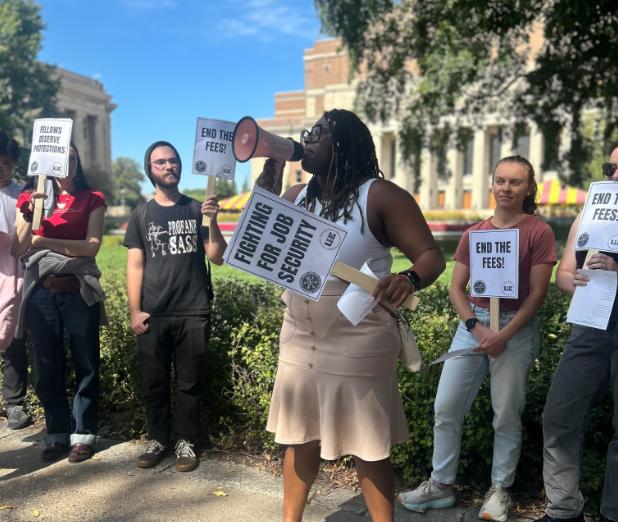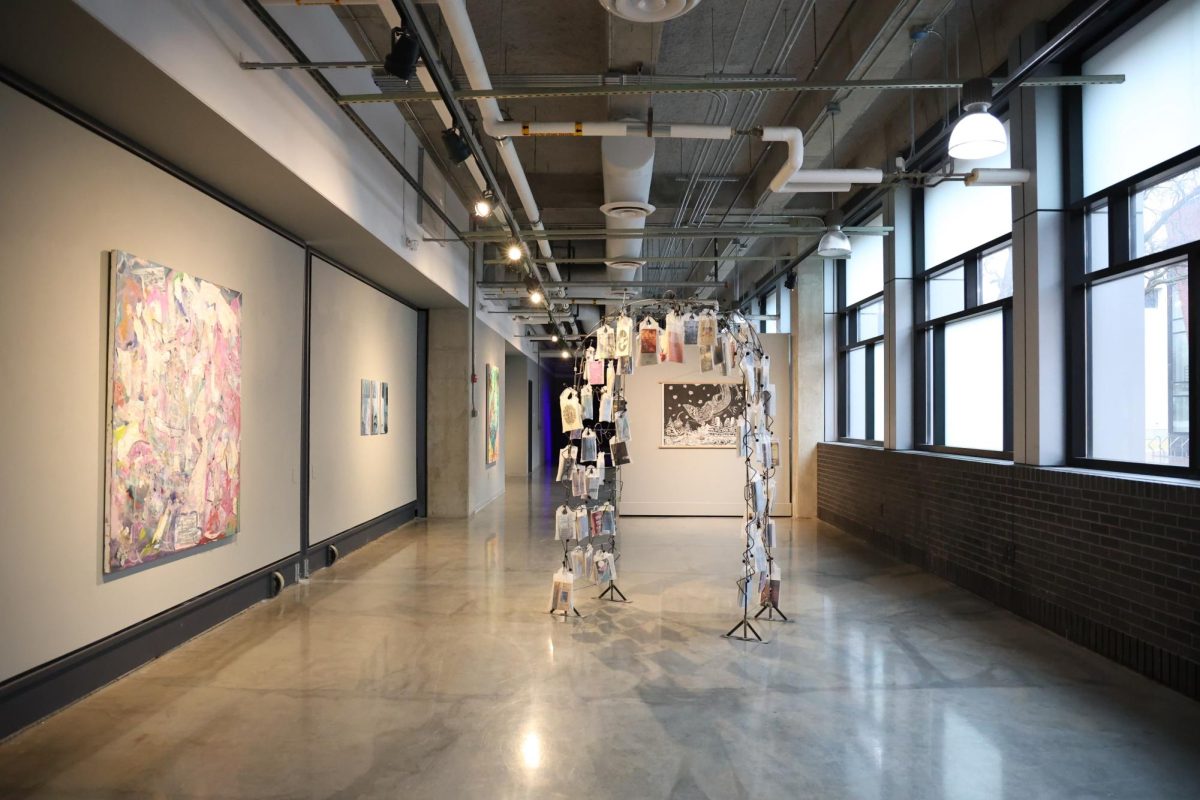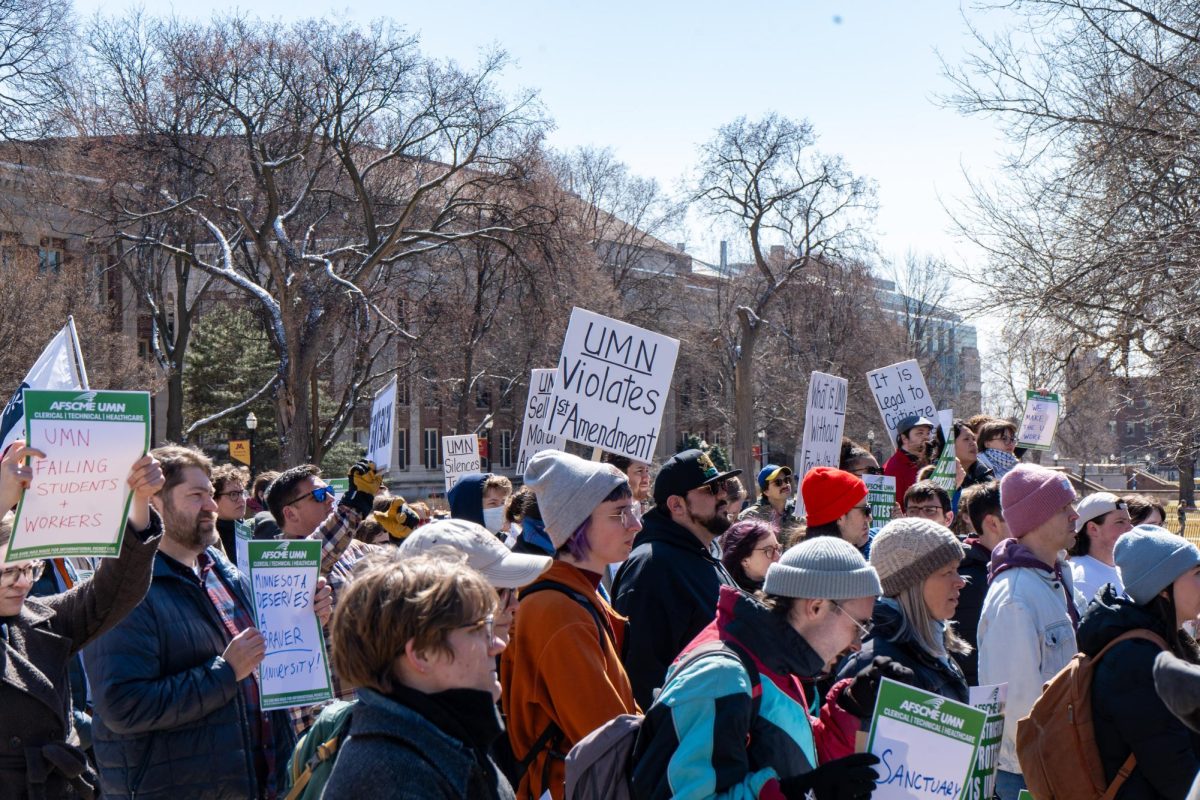The Bureau of Mediation Services (BMS) temporarily suspended negotiations between the University of Minnesota and its Graduate Labor Union (GLU) on Oct. 11, following over a year of negotiation.
The University filed a petition with BMS to determine whether graduate and professional fellows and trainees are part of the Graduate Assistant Bargaining Unit. GLU maintains these groups are part of the Graduate Assistant Bargaining Unit, while the University maintains they are not.
The day after the University filed its petition, BMS issued a Maintenance of Status Quo order that suspended negotiations until a determination is made, according to University spokesperson Jake Ricker in an email to the Minnesota Daily. Suspension of negotiation is required when such an order is issued while the BMS reviews the petition.
Ricker said mediation will resume once BMS completes its review and issues a decision.
“The University looks forward to resolving this issue and resuming mediation,” Ricker said in the email.
Graduate fellows are graduate students who conduct research and teach at the University. They are not considered employees of the University and therefore do not have many of the protections University employees have.
The contract would have applied to students who fall under the Minnesota Public Employment Labor Relations Act (PELRA). PELRA allows for the unionization of university student workers and for graduate fellows to be part of collective bargaining units or unions.
Sam Boland, a member of GLU’s bargaining committee, said the University’s interpretation of the law does not change anything because they do not consider graduate fellows to be public employees.
According to an update on the Office of Human Resources website, the University maintains fellowships are non-service awards to graduate students, as fellows do not work assigned hours or under University direction.
Boland said the University’s decision to file the BMS petition on Oct. 10 caught the committee off guard since they have been negotiating for over a year now. The parties have been negotiating for a contract that would raise wages, lower student fees and guarantee better workplace protections for graduate students.
“We did not want to stop bargaining,” Boland said. “So we proposed that we would enter into a joint agreement with the University to suspend negotiations over fellows and let this legal process carry out, then let us continue negotiating over everything else.”
During a bargaining session on Oct. 10, GLU members believed they and the University would issue a joint petition to BMS, Boland said. He said that an hour after the session ended, the University filed its petition without notifying GLU bargaining committee members or the BMS mediator.
“We were just really caught off guard because we were led to believe that they wanted to continue negotiating and sign this joint agreement with us,” Boland said. “They didn’t even have the courage to tell us to our face that they were just going to shut everything down, so it was definitely a feeling of betrayal.”
Since the petition and subsequent order to investigate whether fellows should be part of the bargaining unit was filed, GLU members are no longer legally allowed to hold any bargaining sessions, Boland said.
“Our guess is that the University was getting really nervous,” Boland said. “They realized how dissatisfied members are, and kind of saw the writing on the wall that we were preparing for a strike.”
Graduate student Caleb Allen said part of his job is presenting his research at conferences, which is a way to gain recognition with others in his field and raise the prestige of his department.
Although Allen’s department, art history, was able to give him some aid for travel to an upcoming conference in Toronto, Allen still had to take on $1,000 of credit card debt in order to participate.
“We could have actually had a decent contract by now,” Allen said. “One where, ideally, I would be able to offset some of these conference costs without having to take on more credit card debt.”
Allen said since graduate students are still paying over $1,000 in fees, which is almost half a monthly paycheck, it is hard for them to feel valued by the University.
“We’re pretty integral to the research process,” Allen said. “And yet, after a year of not bargaining in good faith with us, they can then turn around and file a petition that basically could end up suspending bargaining for even more months.”
International graduate student Chelsea Rodriguez said she came to the University hoping for a contract for graduate students. Now, she is not sure when that will happen.
“I have no idea when we’re going to be able to come to an agreement or a contract,” Rodriguez said. “It just means another semester of paying over $1,000 in fees. It can be really difficult as a financial situation having to put out that money again and again.”
Correction: A previous version of this article inaccurately stated PELRA does not allow for graduate fellows to be part of collective bargaining units or unions.















David
Oct 23, 2024 at 5:08 pm
Paddy, what do you mean by “There is no such thing as a joint agreement to ignore the law?” I think you’re misunderstanding a key portion of this story entirely–if the union and university filed jointly, only a partial MSQ would have been issued, as is common practice at the BMS. If the university was conducting itself in good faith, why would they go back on a verbal agreement to file jointly?
Gull
Oct 23, 2024 at 10:07 am
If what you’re saying is true, Paddy, why not include that information in this article or in a follow up article? Are you a fellow who feels like they had no say? Share your experience so we can all be better informed.
It’s hard to believe that the union didn’t talk to fellows to find out what they wanted to do. It’s much easier to believe, based on all prior behavior, that Admin is using this to complicate a situation they prefer to remain unresolved.
Paddy
Oct 22, 2024 at 9:42 am
Except it was the union who insisted they would include fellows without the fellows having a say in it. The University is in a bad spot, if they agree to include they are subject to legal action from any fellow who did not get to indicate their preference. If they exclude the union files and the University is again in court. The legal resolve is to file with the BMS and have the issue resolved. There is no such thing as a joint agreement to ignore the law, the status quo order is to protect the rights of the union. Should the parties decide to settle a contract and then later negotiate terms and conditions for fellows, the fellows would be at the mercy of the employer without the right to strike given a contract would be in existence. While it is sad the parties have been negotiating for a year without a settlement, we can’t know what is holding up the deal unless we know what the demands and responses are. The process will play out and the two sides will be looking after their best interests.
Max Vast
Oct 22, 2024 at 8:48 am
The update to the PELRA law *specifically* DOES include graduate and professional fellows. This was clearly the intent of the law and the authors of the update have sent a letter to the University. Please issue a correction to your article. Allowing the University’s narrative on fellows to stand as true is inaccurate journalism.
From PELRA: (10) The Graduate Assistant Unit consists of includes the positions of all graduate assistants who are enrolled in the graduate school and who hold the rank of research assistant, teaching assistant, teaching associate I or II, project assistant, ***graduate school fellow***, graduate school trainee, ***professional school fellow***, professional school trainee, or ***administrative fellow I or II***. The listed ranks do not coincide with the ranks that are categorized by the University of Minnesota as professionals in training, even though in some cases the job titles may be the same.
a teacher here
Oct 21, 2024 at 12:17 pm
This is a typical union-busting tactic. Admin is trying to provoke a grad student strike – the grads want to keep negotiating for a solid contract, Admin wants to impede that but they don’t want to be honest about it. By using BMS to suspend negotiations, Admin is throwing rocks and hiding their hands; Admin that refuses to negotiate in good faith, Admin that doesn’t want to respect any rules but their own. If the grads do strike, it’ll be because Admin refused to come to the table with clear and authentic intention to reach a respectful and respectable contract. We see you grad workers! We support you! Teaching and working conditions are learning and working conditions for our undergrads. If Admin cares about undergrads, they must also care about grad students. Admin needs to return to the bargaining table and sort this out.